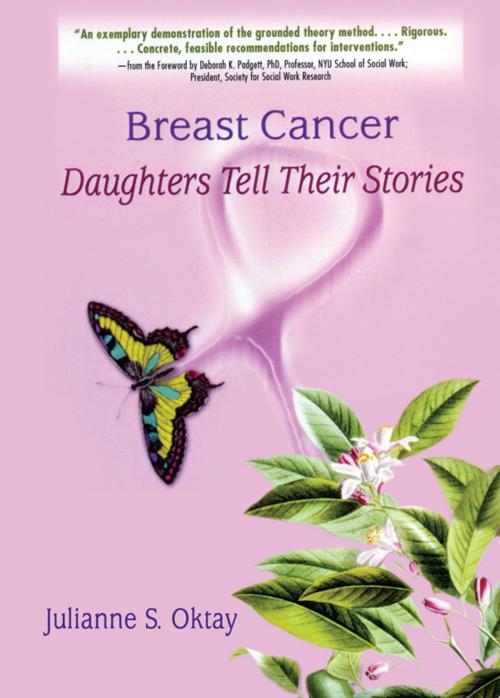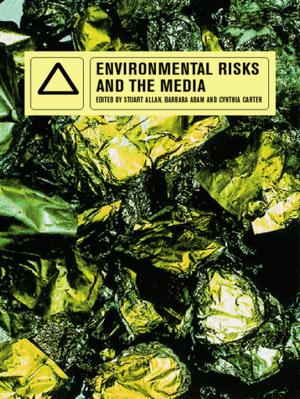Breast Cancer
Daughters Tell Their Stories
Nonfiction, Social & Cultural Studies, Social Science, Gerontology, Health & Well Being, Medical, Patient Care, Health Care Delivery| Author: | Julianne S Oktay, J Dianne Garner | ISBN: | 9781135418250 |
| Publisher: | Taylor and Francis | Publication: | December 16, 2013 |
| Imprint: | Routledge | Language: | English |
| Author: | Julianne S Oktay, J Dianne Garner |
| ISBN: | 9781135418250 |
| Publisher: | Taylor and Francis |
| Publication: | December 16, 2013 |
| Imprint: | Routledge |
| Language: | English |
*I will always and forever feel I have a 'hole' in my life where my mother once existed.
I think, when you have to think about the fact you might have to take care of your parents someday and juggle kids at the same time It's a scary proposition.
We had open communication during and before the breast cancer. But then after the breast cancer, I was often afraid to bring things up, in trying to protect Mom.*
This insightful book tells the stories of women whose mothers had breast cancer. It uses their own voices to express the common fears and expectations of daughters in the periods before and during their mothers' illnesses, involving genetic risks, death and dying, and changes in their relationships. The case studies, tables and figures, and two appendices will benefit health professionals and counselors, while the poignant narratives will help mothers and daughters better understand their experiences with breast cancer.
I was kind of surprised to be alive and free of cancer at age 42, when at this point my mother was crippled by metastases. When I get to be 43-the age at which my mother died, or maybe when I get to 44-it's like, 'what do I do?' I have this life that I didn't expect to have.
Breast Cancer: Daughters Tell Their Stories presents the results of a qualitative, grounded theory study of breast cancer survivors, providing in-depth information about an aspect of breast cancer that has been previously overlooked. The book examines the daughters' experiences through four phases-the period prior to mother's illness, the period during mother's illness and treatment, the period following mother's death (if mother dies), and the long-term impact. From this study, recommendations are compiled for providing or improving services for tomorrow's daughters.
*The radical mastectomy left her scarred and disfigured below her nightgown. It was bruised and nasty looking. That was kind of scary. I think that has terrified me since. Sometimes I'll have pains in my left breast and that's what I visualize. It's terrifying.
I'm not really obsessed about dying of cancer. I'm more along the line of, 'If this is going to happen to me, and there's a chance it's going to, I'm gonna survive. I'm not going to die from it.*
From an empathetic perspective, this book reveals how many daughters react to and deal with their mothers' diagnoses, depending on their age and family situation at the time of their mothers' illnesses. It shows how daughters can gain a more accurate idea of their level of risk by providing educational materials and developing new strategies for communication. It also helps breast cancer survivors see how their illnesses can shape their daughters' future outlook, offering new inspiration for resolving and preventing family crises.
*I will always and forever feel I have a 'hole' in my life where my mother once existed.
I think, when you have to think about the fact you might have to take care of your parents someday and juggle kids at the same time It's a scary proposition.
We had open communication during and before the breast cancer. But then after the breast cancer, I was often afraid to bring things up, in trying to protect Mom.*
This insightful book tells the stories of women whose mothers had breast cancer. It uses their own voices to express the common fears and expectations of daughters in the periods before and during their mothers' illnesses, involving genetic risks, death and dying, and changes in their relationships. The case studies, tables and figures, and two appendices will benefit health professionals and counselors, while the poignant narratives will help mothers and daughters better understand their experiences with breast cancer.
I was kind of surprised to be alive and free of cancer at age 42, when at this point my mother was crippled by metastases. When I get to be 43-the age at which my mother died, or maybe when I get to 44-it's like, 'what do I do?' I have this life that I didn't expect to have.
Breast Cancer: Daughters Tell Their Stories presents the results of a qualitative, grounded theory study of breast cancer survivors, providing in-depth information about an aspect of breast cancer that has been previously overlooked. The book examines the daughters' experiences through four phases-the period prior to mother's illness, the period during mother's illness and treatment, the period following mother's death (if mother dies), and the long-term impact. From this study, recommendations are compiled for providing or improving services for tomorrow's daughters.
*The radical mastectomy left her scarred and disfigured below her nightgown. It was bruised and nasty looking. That was kind of scary. I think that has terrified me since. Sometimes I'll have pains in my left breast and that's what I visualize. It's terrifying.
I'm not really obsessed about dying of cancer. I'm more along the line of, 'If this is going to happen to me, and there's a chance it's going to, I'm gonna survive. I'm not going to die from it.*
From an empathetic perspective, this book reveals how many daughters react to and deal with their mothers' diagnoses, depending on their age and family situation at the time of their mothers' illnesses. It shows how daughters can gain a more accurate idea of their level of risk by providing educational materials and developing new strategies for communication. It also helps breast cancer survivors see how their illnesses can shape their daughters' future outlook, offering new inspiration for resolving and preventing family crises.















